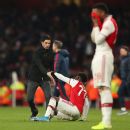All the festive football action in the Premier League is done and dusted. We get you caught up on the action with the Weekend Review.
JUMP TO: Arteta needs to change Arsenal’s mentality | Lampard is still learning | Liverpool are going to win the title | A lesson for Jose Mourinho | Ancelotti’s short-term impact is being felt | West Ham waited for too long to make a change | Bournemouth are in relegation form | Luckiest moment of the weekend | Something needs to change at Villa | Deeney and Pearson combine to revitalise Watford | Tight offsides are changing the game
Arteta needs to change the whole Arsenal mentality
After their most Arsenal of Arsenal implosions against Chelsea, only two teams have now won fewer games than the Gunners this season. They are Norwich and Watford, the 19th and 20th placed sides in the Premier League.
1 Related
It’s almost becoming cruel to watch Arsenal fans get excited about 30 minutes of good football, as they were after their first-half display on Sunday, only for it to all disappear down the toilet. It’s a bit like observing a kid on one of those fairground machines with the grabbing claw, picking up the teddy bear and carrying it halfway to the hatch before — o, cruel fate — it slips from the claw’s grasp and the child’s spirits are crushed. We all know they’re not actually going to get the teddy bear, but for a short while there’s enough hope to make them think it’s possible.
Mikel Arteta has been Arsenal manager for two games now and at least he has a full appreciation of the job he has on his hands, if he didn’t before. He not only has to fix a football team but change a mentality that runs through a whole club, a sense that the four minute spell in which Bernd Leno waved at a cross to let Jorginho score then Tammy Abraham was politely allowed to spin and finish, was inevitable. Not so much a consequence of two individual mistakes but a manifestation of an entire club’s vibe.
The good news is that Jurgen Klopp has managed it, albeit in different circumstances, and some of the raw materials are there for the new manager. Arsenal have some terrific players, if they all stick around, and if Arteta is afforded the time he can still fix them. A lot of time, of course.
1:15
Frank Lampard explains how an aggressive half-time discussion helped Chelsea beat Arsenal.
Remember that Lampard is still learning
How much of Chelsea’s comeback against Arsenal can you put down to shrewd tactical changes by Frank Lampard? Maybe not much, but it is at least encouraging that Lampard is being proactive: When Plan A wasn’t working he quickly shifted to and tried something different, switching systems and personnel significantly. Obviously you could say that he is simply throwing stuff at a wall and seeing what sticks, but it’s easy to forget that this is still just his second year as a manager. There’s going to be a lot of that.
Thursday’s 2-0 defeat to Southampton was troubling, but there will inevitably be these bumps and bad results and even bad runs of form with a young coach and a flawed squad. For the moment, Chelsea should be relatively content with where they are.
1:15
Pep Guardiola says Manchester City are out of the title race with Liverpool 14 points ahead of them.
Get used to the fact Liverpool are going to win the title
Liverpool have now taken 82 points from the last 84 available, stretching back into the final nine games of last season. That, dear reader, is ludicrous. These past two games have seen them be sensationally good and be pretty lucky, both separately and at the same time, and when those two things combine it’s basically impossible for them to be stopped.
They’re going to win the title for the first time in 30 years, and at the very least if the thought of that upsets you, at least you’ve got a few months to get used to it.
1:21
Steve Nicol finds it surprising Jose Mourinho’s Tottenham has become uncharacteristically shaky in defense.
A lesson for Jose Mourinho
Two games, four points won against modest opposition but the most valuable thing Jose Mourinho might learn from Tottenham’s festive games might be that it’s time to build his team around Tanguy Ndombele.
When Mourinho made a passive-aggressive reference to wanting players who will physically sacrifice themselves after Ndombele said he wasn’t fit enough to face Brighton, you feared for the Frenchman. But his performance against Norwich showed that he is currently the only player Tottenham have capable of running their midfield, in the same way that Mousa Dembele did at his peak. He has invention, skill, imagination and drive and while their other midfielders individually have some of those qualities, nobody has them all like Ndombele does.
Hopefully Mourinho doesn’t take his macho schtick about men being men and playing through injuries too far, because Ndombele has the potential to be the beating heart of Tottenham’s next great team.
1:20
Carlo Ancelotti praised Everton’s “fighting spirit” in the second half of their 2-1 win over Newcastle United.
Ancelotti’s short-term impact is being felt
There are still significant doubts as to whether Carlo Ancelotti is who Everton need in the long-run, but his short-term impact has been superb. They look much more together, more organised, more assertive and generally like they know what they’re doing, as opposed to the apathetic rabble under Marco Silva and the unsustainable dogs of war in Duncan Ferguson’s brief tenure.
A relatively minor beneficiary of Ancelotti’s early days might be Mick McCarthy: One of the Ireland manager’s key selection issues has been how to get his captain Seamus Coleman and Matt Doherty into the same team, but Ancelotti deploying Coleman as a central defender in a back three might just solve that problem.
1:08
Former West Ham goalkeeper Shaka Hislop reacts to the Hammers’ decision to bring back David Moyes as manager.
West Ham waited for too long to make a change
Of course you can only glean so much from press conferences and public appearances, but listening to Manuel Pellegrini speak doesn’t exactly inspire confidence that he is a man to turn around a failing team. And West Ham are a failing team, a lopsided squad with a shaky defence and a pedestrian midfield, which is something the board should probably have recognised before losing to Leicester’s reserves turned out to be the last straw.
Results against Chelsea and Southampton were enough to keep Pellegrini in place but they were the exceptions for a side that has basically been abysmal since September. And the solution the board have come up with is returning to the guy they didn’t think was good enough 18 months ago, when they replaced him with Pellegrini.
Maybe David Moyes will be the man to turn things around for West Ham, but it feels like a punt. It wouldn’t be a surprise if going back to Moyes turns out to be just as bad a mistake as leaving Pellegrini in place for so long.
Bournemouth are in relegation form
You can offer some excuse for Bournemouth’s awful form because of their awful injury list, but that list is getting shorter and their results aren’t getting much better. They have won four points from the last available 27, Callum Wilson hasn’t scored since September and the team hasn’t scored more than once in a game in the same period. They have been in relegation form for some time and if that doesn’t change soon then their league position will match that.
Luckiest moment of the weekend
Still, one man thankful for the interventions of the big infallible offside machine will be Jan Vertonghen, whose bafflingly passive defending against Norwich, casually observing Teemu Pukki take the ball down on his chest and finish rather than, you know, trying to do anything about it. An extremely lucky man.
Something needs to change at Villa, but not the manager
Maybe it was a shock tactic designed to get something better from a team that has only won one of the last seven, but it was still pretty alarming to hear Dean Smith question his players’ effort levels after their defeat to ten-man Watford.
“The last few games I have questioned it,” he said. “Second half at Sheffield United I didn’t think we showed enough and first half today we definitely didn’t show enough.”
Villa are in the bottom three and, with Watford showing signs of life, currently only look like they’re heading downwards. But hopefully the club don’t panic and get rid of a manager who has taken them from floundering mid-table Championship nothingness to the Premier League: something needs to change at Villa, be that a couple of new signings, a new system, a more pragmatic playing style or a combination of all that, but that something shouldn’t be the manager.
Deeney and Pearson combine to revitalise Watford
That said, Watford have shown what positive difference a change in the dugout can make. They have looked like a different side since Nigel Pearson arrived, in that they actually look like a football team, rather than a loosely collected group of individuals who just all happened to be wearing the same colour clothes.
Pearson’s no-nonsense approach was always likely to have an affect in the short-term, so the real test will only be how things look in a couple of months time. But at the very least they are in with a fighting chance of staying up, whereas before they looked doomed.
The return of Troy Deeney is another significant factor, too. He had been absent since the second game of the season, but after coming back into the team a few weeks ago, he is at something close to full fitness now. He scored twice against Villa, but he contributes more than that, a leader in both tangible and intangible ways, and it’s not a coincidence that Watford’s performances have improved significantly since his return.
1:15
VAR may have gotten things right in Liverpool-Wolves, but Shaka Hislop says its implementation has been flawed.
Tight offsides are changing the game, and not for the better
From a cold, logical perspective, we shouldn’t really be complaining about these millimetre-tight offside calls: You’re either offside or you’re not, and we don’t object when goalline technology decides that a ball is millimetres over the line.
The criticisms of it are still valid though, from the basic problem that the systems being used are not necessarily perfect, to the idea that these cigarette paper decisions are so far away from the reasons the offside rule was introduced as to be almost unrecognisable.
But the idea that they will discourage attacking play is another issue. Strikers have been trained — subliminally conditioned, even — for their entire careers to play on the limit of offside, in old-fashioned coaching parlance on “the shoulder of the defender,” and now they’re being penalised for it. Pretty soon runs will be held back, decisions second-guessed, strikers more cautious. And will that make the game better? Almost certainly not.
You could argue that footballers always adapt to these things, but should they have to? Were things really so bad before that we needed this? Were defenders really feeling aggrieved that a striker had gained such minimal advantage? The problems in officiating weren’t these minuscule offsides, but rather the dreadful refereeing howler. Those were the things people complained about. Really, we should have just accepted that officials got things right for the most part but made occasional mistakes, and just been adults about it.
Credit: Source link

